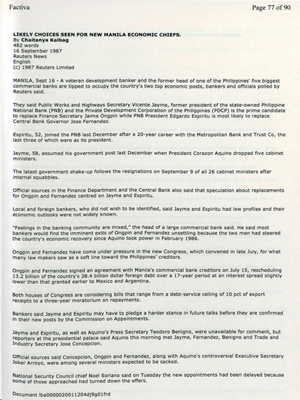CABINET RESHUFFLE SEEN AS LAST CHANCE FOR AQUINO AS CONFIDENCE WANES
[Reuters]
Published date: 10th Sep 1987
10 September 1987
Reuters News
English
(c) 1987 Reuters Limited
MANILA, Sept 10 – Philippine President Corazon Aquino has been given a final chance to cobble together a cohesive government thanks to the resignation of all 26 of her cabinet ministers, bankers, businessmen and stockbrokers said.
They said the turmoil of the past two weeks, beginning with the bloody August 28 coup attempt, the worst in Aquino’s 18-month rule, had severely eroded investor confidence, raised interest rates and revived foreign- currency speculation.
Several businessmen hoped Aquino would sack her closest adviser, controversial executive secretary Joker Arroyo.
“I think what we will get is a more cohesive cabinet that will speak with one voice,” finance secretary Jaime Ongpin said.
Ongpin told Reuters he would like to see the government concentrating on urgent economic issues.
“There have been fundamental differences of opinion and there’s been prolonged debate which needs to be resolved in a definitive manner,” he said.
He said Arroyo’s allegation that three top businessmen were working to destabilise the government was a factor in the cabinet’s decision to resign and give Aquino a free hand.
“There is no question that (the recent crises) are affecting the attitude of both the Filipino and foreign Investors and that is why I think it is very important to have a cabinet revamp,” Ongpin said
Ongpin said Aquino had not said which resignations she would accept, adding, “Nobody is indispensable.”
Asked about the effect his own resignation was likely to have on the managment of the country’s 28.4 billion dollar foreign debt, Ongpin said, “The president really has to decide. I don’t want to second-guess her.”
Ongpin said despite the upheavals, he was not pessimistic about the economy’s performance, although the government has scaled down its gross national product (GNP) growth forecast for 1987 to between 5.2 and 5.7 pct from an ambitious 6.5 pct.
The economy grew 1.5 pct in 1986 after contracting 3.8 pct in 1985 and 6.8 pct in 1984. The government has said GNP grew by 5.1 pct between January and June.
“There has been a smart recovery in the first quarter,” Ongpin said, “There have doubtless been problems with the severe drought, investment is not as high as we expected, exports are not rising as fast as we expected.”
Jose Facundo, president of CityTrust Banking Corp and of the Management Association of the Philippines, told Reuters interest rates were inching upward, while the peso’s blackmarket rate had risen to about 21.10 to the dollar.
An official of the Bankers’ Association of the Philippines said the official peso-dollar rate had deteriorated from 20.453 the day before the coup attempt to 20.60 on Wednesday.
Facundo said the key overnight call rate of the Central Bank had risen to about 13.8 pct from 10.5 pct in mid- August.
But prime lending rates were hovering between 11 and 12 pct and he did not see any alarming developments.
Another banker said the recent crises had revived speculation in dollars in an ominous echo of the hoarding of foreign currency that followed the August 1983 assassination of President Aquino’s husband Benigno and was among factors that sparked the subsequent collapse of the economy.
In another sign of unease, a top stockbroker who did not want to be identified said foreign investors on the two Manila stock exchanges were leaving.
“(They are) getting out while the going is good,” he said. “In the past they always bought on weakness, but
now they are selling on strength.”
Robert Coyiuto, president of the Manila Stock Exchange, said the market was moving up on news of the resignations.
“It’s seen as a positive development, a sign that Aquino is doing something, ” he said.
He said the market opened strongly, but after slipping slightly in the first hour, appeared to be holding steady at levels above Wednesday’s close. The Manila Stock Exchange’s composite index plunged to 899.91 on Wednesday from 1,093.03 the day before the coup attempt. Post-coup trading has been marked by continuous declines, except for brief rallies on September 2 and 8.






